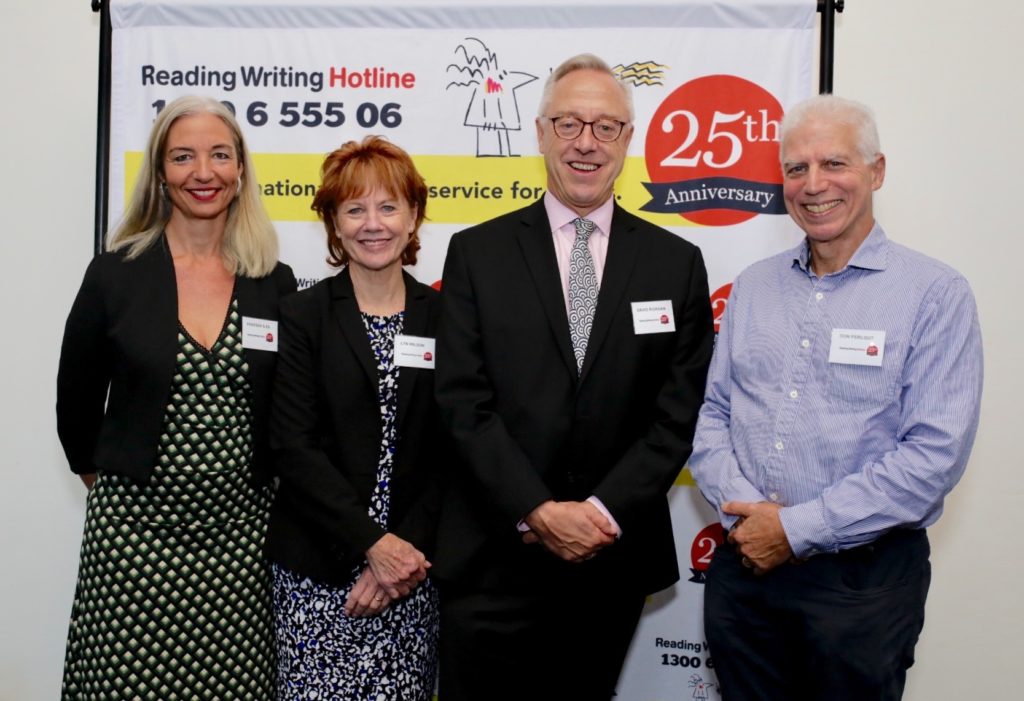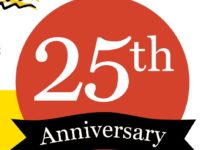CCA’s CEO, Dr Don Perlgut, spoke at 25th Anniversary celebration of the Reading Writing Hotline in Sydney on 15 April 2019. Other speakers included Vanessa Iles, Hotline Manager; Lyn Wilson, TAFE NSW; and David Riordan, Director of City Operations for the City of Sydney (see photo at end of this post).
Don Perlgut’s speech
I am greatly honoured to be here today and have been asked to speak. Because in many ways the Reading Writing Hotline embodies some of the best moments of my professional life, from 1994 to the present in 2019.
Let me go back and give you some history. I first developed my commitment and concern for disadvantaged and vulnerable communities while studying one summer as an undergraduate at the University of California at Berkeley. I took a course by a young – older than me, but still young – lecturer in politics from Carleton College in Minnesota. He was built like a wrestler – indeed he was a former American college wrestler – and stood only five feet six inches tall. He shared with us, his students, his passion for social and economic justice. I was moved, in a way I had not been during my then tender 19 years of life.
That man was Paul Wellstone, later to become a Democratic Senator from the State of Minnesota and a major force in US progressive politics. He died tragically in a plane crash in 2002.
In parts of the USA, his name still invokes awe. Last month, a Minnesota newspaper wrote that “the legacy of Senator Paul Wellstone is palpable in the 2020 presidential campaign”, with at least three presidential candidates citing him as an inspiration, including Senators Elizabeth Warren and Amy Klobuchar.
I too count the late Senator Wellstone, my former teacher, as an inspiration. So when I found myself working as an educational policy manager in ABC Television in the late 1980s under a different inspirational leader – that was David Hill – one who was eager to make a difference, I was given the job of spearheading the ABC’s activities in adult literacy. It’s not like there was any competition for the role. The journalists had no interest, but I knew from my years of work as a social planner in Western Sydney and northern New South Wales of the potential power of mass education and what ABC TV and ABC Radio could do to assist International Literacy Year in 1990.
The time was ripe to convince the ABC Board and Managing Director that the ABC had a role in promoting and teaching adult literacy. We based our activities on the BBC, which had completed a successful TV series and campaign in the mid-1970s called “On the Move”. We considered the questions: were we trying to teach via TV and radio, or just motivate students to seek assistance? We tried both.
We worked closely with the Adult Literacy Information Office – known as ALIO – the predecessor organisation to the Reading Writing Hotline, whose 25th anniversary we are celebrating today. In 1993 and 1994 we produced our major adult literacy TV series: “The Reading Writing Roadshow”, a 20-part drama and teaching series that remains one of my proudest achievements.
I didn’t produce the series, but I found the money from the Commonwealth Government and from inside the ABC, and I played the role of liaison between TAFE and the ABC. Imagine getting two big behemoth organisations to work together – both of them, by the way, much larger than they are now.
It was a challenge, but the result, I believe, was worthwhile – one, dare I say, worthwhile repeating. Yes, that’s right, harnessing the efforts of the national broadcaster and Australia’s largest VET provider to produce and disseminate high-quality reading writing teaching materials, and then encouraging people to seek help.
So if any national politicians are listening: here’s my call to the next Government of Australia. Please start a national educational campaign, and not just awareness, but genuine educational delivery, using our national broadcasters, the structure of the Reading Writing Hotline and the network of adult literacy providers – including the valuable not-for-profit community sector – to tackle Australia’s literacy challenges head-on.
I don’t want to take undue credit for the ABC’s activities in that period of the early 1990s, as a number of ABC and TAFE NSW staff were instrumental, in the two major co-productions undertaken with TAFE.
After my time in the ABC, my professional life toured through other literacies – digital literacy and later financial literacy with ASIC’s MoneySmart program.
And now I find myself back in the same space, some 25 years later – the same 25 years that this august organisation, the Reading Writing Hotline, has been in existence.
As the CEO of Community Colleges Australia, I represent, I advocate for and I look after Australia’s not-for-profit adult and community education providers. Most of the people in this room know what our sector’s areas of expertise are – reaching Australia’s most vulnerable and disadvantaged learners – especially through what is now called “foundation skills”, but which I still call adult literacy and numeracy.
Australia’s not-for-profit community providers over-perform when it comes to reaching the most disadvantaged through Australians vocational education and training: people from lower incomes, Indigenous Australians, people with disabilities, people from non-English speaking backgrounds, and learners over age 45.
But there’s one area where the not-for-profit sector towers over all other providers, and that is in reaching regional and rural Australians.
While only one third of New South Wales population lives outside of metropolitan Sydney, the not-for-profit community sector delivers two thirds of its government-funded VET outside of Sydney – much of it lower level VET, including foundation skills.
Why does this matter?
- Because the further you travel from Australia’s capital cities like Sydney – to inner regional, outer regional, remote and very remote communities – the rates of literacy, of all sorts of literacy, decrease.
- Because the further you travel from Sydney, the lower the formal educational attainment rates are.
- Because the further you travel from Sydney, the fewer people study at university and the more people study VET. And when they study VET, it is in the lower level certificates and packages.
This is one of the most powerful reasons for the existence of the Reading Writing Hotline, because regional and rural Australians simply don’t have the same access to education as their city cousins do. And a national, quality-controlled, hotline is an essential part of ensuring that access.
For these reasons Community Colleges Australia proposed last year to the National Centre for Vocational Education Research (NCVER) that they commence a study on adult literacy and community providers in regional and rural Australia. The NCVER has resourced and commenced this study, which starts reporting results at its July national conference in Adelaide.
So I have come full circle in my professional life. The social planner, policy analyst and adult educator inside me have all merged in my advocacy for adult literacy.
It is with a great deal of pride that I participate in the management advisory committee of the Reading Writing Hotline, and in this celebration.
With a great deal of hope I put it to the next Government of Australia that there has never been a better time to resurrect a national adult literacy education program, using broadcast TV, radio, podcasts, the Internet, actual paper-based books, our diverse literacy providers and our valuable Reading Writing Hotline.
May the Hotline live for another 25 years.
With a bit of luck and a lot of hard work, may Australia have no need for the Hotline after that.
It’s in our hands.
Thank you.
(Photo below from left to right: Vanessa Iles, Lyn Wilson, David Riordan & Don Perlgut)






